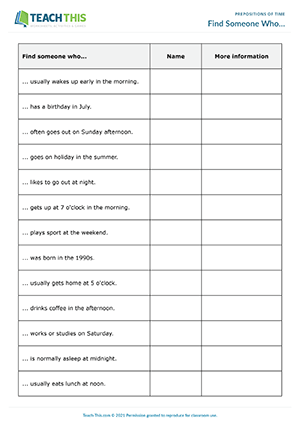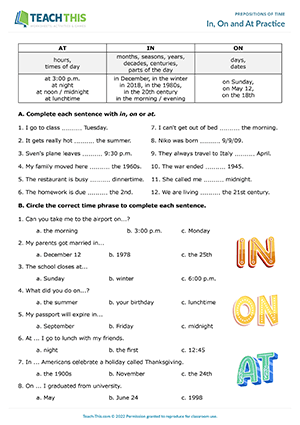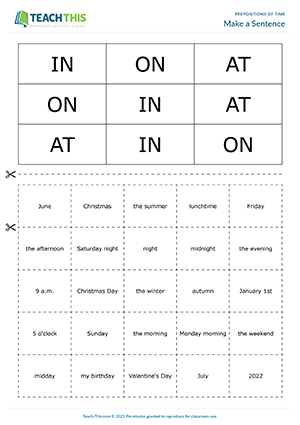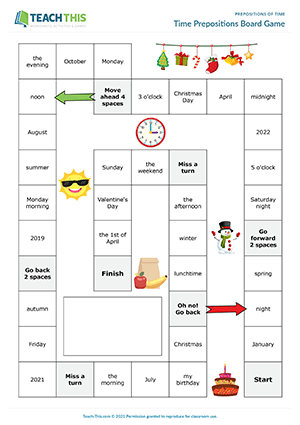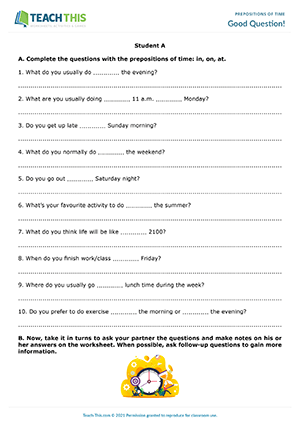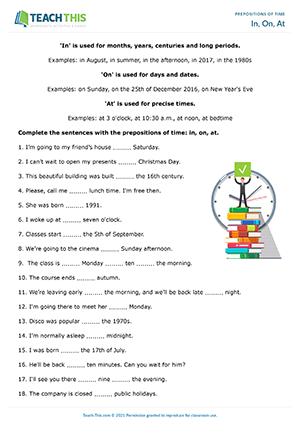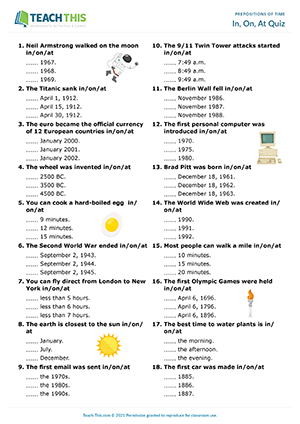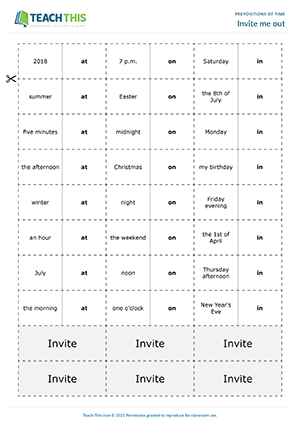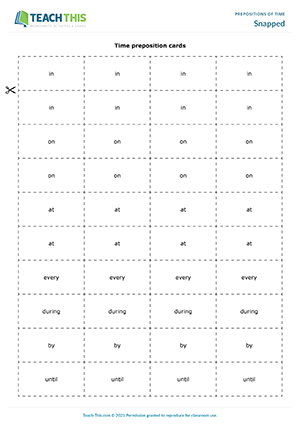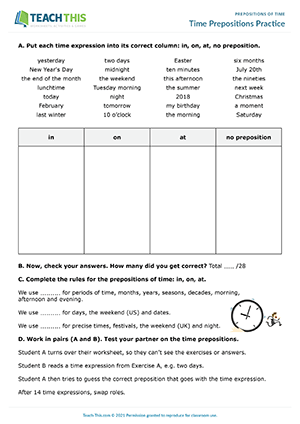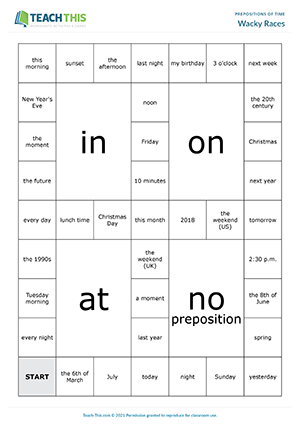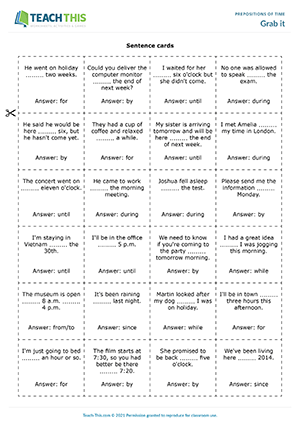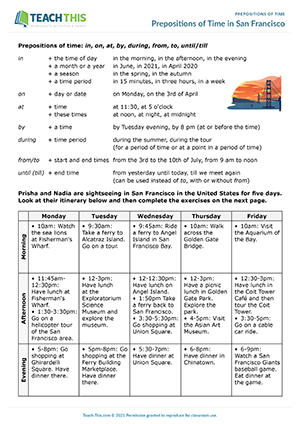In this free prepositions of time speaking activity, students ask and answer yes/no questions that contain prepositions of time. Students start by preparing the questions they need to ask in order to do the activity. Students then go around the class, asking each other the questions, e.g. 'Do you usually wake up early in the morning?' When a student finds someone who answers 'yes' to a question, the student writes down their name and asks a follow-up question to gain more information, noting down the answer. When everyone has finished, students give feedback to the class on what they found out.
This useful prepositions of time worksheet helps students learn and practice the time prepositions: in, on, at. First, students complete sentences with in, on or at. Next, students circle the correct time word or phrase to complete each sentence according to the preposition of time used. After that, students match time questions with answers. Students then move on to read a party invitation and answer questions about it using prepositions of time. In the last exercise, students fill in a weekly calendar with the current month and dates for next week. Students then write down things they have to do next week and the times they need to do them in the calendar. Finally, students tell a partner about the things they have to do using prepositions of time.
In this productive prepositions of time game, students match time prepositions with time expressions and make sentences with prepositional time phrases in order to win squares in a game of Tic-Tac-Toe. In pairs, students take it in turns to pick up a time expression card and choose a time preposition square on the grid that they think matches with the time expression. The student then makes a sentence using the prepositional time phrase. If the student makes a grammatically correct and suitable sentence, they mark the square with an O or X. This continues until one student gets three squares in a row. That student wins the round and scores a point. Students play several rounds. The student with the most points at the end of the game wins.
In this creative prepositions of time board game, students match time prepositions (in, on, at) with time expressions and make sentences with the prepositional time phrases. Players take it in turns to roll the dice and move their counter along the board. When a player lands on a time expression square, they look at the cards in their hand and find a time preposition card that matches with the time on the square, e.g. on Saturday. If the player has a suitable time preposition card, they lay the card on the table and make a sentence using the prepositional time phrase, e.g. 'I don't study English on Saturday'. After the player has made a sentence, they place their time preposition card at the bottom of the pile and take another one from the top. If the player is unable to make a sentence, they go back two squares. The first player to reach the finish wins the game.
In this free prepositions of time speaking activity, students complete questions with time prepositions and then ask and answer the questions with a partner. Working alone, students complete questions on their worksheet with the prepositions of time: in, on, at. In pairs, students then take it in turns to ask their partner the questions and make notes on their answers. Finally, students give feedback to the class on what they found out about their partner.
In these two fun prepositions of time activities, students do a worksheet where they complete sentences with prepositions of time and play a game where they match time expressions with the prepositions: in, on, at. Students begin by completing sentences on the worksheet with the prepositions of time: in, on, at. After reviewing the answers, give each student a set of time preposition cards and have everyone stand up. Call out time expressions at random. Each time the students hear a time expression, they hold up a matching time preposition card. If students hold up the wrong preposition of time or are too slow, they are out of the game and must sit down. The last student left standing wins the game.
In this enjoyable prepositions of time game, students play dominoes to practice the time prepositions: in, on, at. The first player puts down one of their dominoes on either side of the domino on the table, making sure that the preposition of time matches with the time expression or vice versa. If the player matches the preposition of time successfully, they score a point. For an extra point, the player then uses the prepositional time phrase in a sentence. The other players then take it in turns to match their dominoes in the same way by putting them down at either end of the domino chain and making a suitable sentence when a prepositional time phrase is formed. When a player has gotten rid of all their dominoes, the game ends. The player with the most points wins the game.
Here is a handy prepositions of time quiz for reviewing the prepositions of time: in, on, at. In the quiz, students complete multiple-choice general knowledge statements with appropriate prepositions fo time. In pairs, students complete each general knowledge statement on the worksheet by choosing the appropriate preposition of time (in, on, at) and multiple-choice answer. When the students have finished, review the answers with the class by having a different pair of students read out each answer. Pairs score two points for the correct preposition of time and answer, or one point for the correct preposition of time with a wrong answer or vice versa. The pair with the highest score wins.
In this inventive prepositions of time game, students play dominoes by matching the prepositions of time in, on and at with time expressions and making invitations using prepositional time phrases. The first player puts down one of their dominoes on either side of the domino on the table, making sure that the preposition of time matches with the time expression or vice versa. The other players then take it in turns to match their dominoes in the same way. If a player cannot put down one of their dominoes, they have two options. The player can use an invite card (if they have one) to invite another player to go out using a prepositional time phrase from the dominoes on the table, e.g. 'Would you like to go to the cinema on Saturday?'. The other option is for the player to take a domino from the top of the pile and put it down if they can. The first player to get rid of all their dominoes wins the game.
In this entertaining prepositions of time game, students play snap by matching time prepositions (in, on, at, every, during, by, until) with time phrases and making true sentences with matching pairs. In pairs, one student has a set of time preposition cards and the other has a set of time phrase cards. Both students turn over a card from their pile at the same time. If the preposition of time matches with the time phrase, the first student to say 'Snap' scores a point. For an extra point, the student then tries to make a true sentence using the preposition of time and phrase. Students then pick up their own cards, shuffle the pack and play again. If the time preposition and time phrase don't match, students continue turning over cards until a matching pair comes up and someone says 'Snap'. If a student says 'Snap' when the cards don't match, the other student scores a point and the game continues. The first student to get 20 points wins the game.
In these two free prepositions of time activities, students complete exercises on a worksheet to learn and practice prepositions of time and take part in a Find Someone Who activity. First, students put each time expression on the worksheet into its correct column: in, on, at or no preposition. Next, students complete rules for using the prepositions of time. After that, in pairs, students test their partner on the prepositions of time by reading a time expression to their partner who tries to guess the correct preposition. Next, students complete gaps in a Find Someone Who activity with in, on, at, or no preposition. After that, students prepare the yes/no questions they need to ask in the activity. Students then go around the class, asking each other the questions, e.g. 'Do you like to get up late on Sunday?' When someone answers 'yes' to a question, the student writes down their name and asks a follow-up question to gain more information, noting down the answer. Afterwards, students tell the class about three people they interviewed in the activity.
In this engaging prepositions of time board game, students race against each other to land on time expression squares that match with a preposition of time on their card. The game board contains time expressions that go with the three prepositions of time (in, on, at). However, there are also decoy time expressions included on the board that have no preposition. The aim of the game is to be the first player to complete their time preposition card with eight matching time expressions. Players take it in turns to roll the dice and move their counter along the board in any direction. When a player lands on a time expression square that they think matches with their preposition of time, they tell the other players that they want to write the time expression on their card. The other players then confirm whether the time preposition and time expression match. If they agree, the player writes the time expression on their card. If the preposition and time expression don't match, the player misses a turn. The first player to complete their card with eight matching time expressions wins the game.
In this lively prepositions of time game, students race to complete sentences with the prepositions of time: by, until, during, while, for, since, from and to. Students take it in turns to pick up a sentence card and read it to the other two students using the word 'blank' where the preposition of time should go. The two students listen to the sentence and then race to grab the correct time preposition card to complete the sentence. The first student to grab the correct card and say the preposition of time wins and keeps the two cards. The next student then picks up a sentence card and so on. The student with the most cards at the end of the game wins.
In this comprehensive prepositions of time worksheet, students practice the prepositions of time: in, on, at, by, during, from, to, and until/till. First, students read two people's sightseeing itinerary in San Francisco. Students then complete sentences with prepositions of time from a box. Next, students do a gap-fill exercise where they write times or time periods from a box in sentences. In the last exercise, students imagine that they are in San Francisco for the weekend and write sentences about what they would like to do using the prepositions of time from the worksheet and the activities in the itinerary. Finally, students read their sentences to the class.
Latest Free
Resources
- Call and Respond
Business - Telephoning (B1)
Date Added: 24th of March
- Small Talk Techniques
Small Talk (B1)
Date Added: 20th of March
- Jigsaw Reading
Reading Exam Preparation (B1)
Date Added: 7th of March
- Writing Jeopardy
Writing Exam Preparation (B1)
Date Added: 6th of March
- Present Perfect Bingo
Present Perfect Yes No Questions (A2)
Date Added: 4th of March
Latest Member
Resources
- Please hold for a moment
Business - Telephoning (B2)
Date Added: 4th of April
- A Day out in Tokyo
Describing Places (A2)
Date Added: 1st of April
- Who Went Where?
Past Simple Wh Questions (A2)
Date Added: 1st of April
- Identifying Bias
Critical Thinking (B2)
Date Added: 31st of March
- Perfect Punctuation
Writing Exam Preparation (B1)
Date Added: 27th of March



